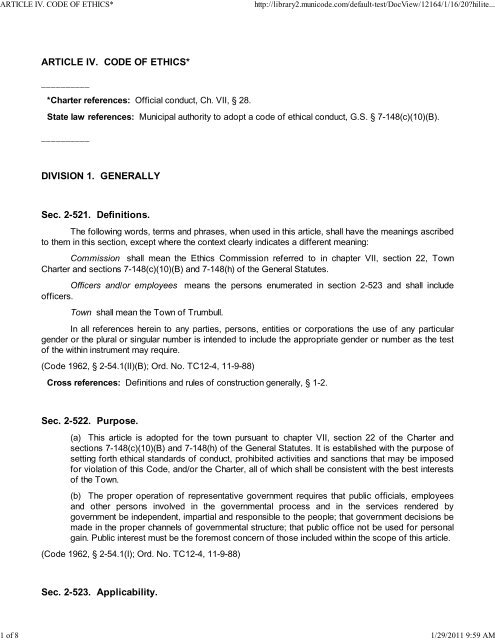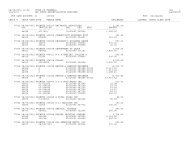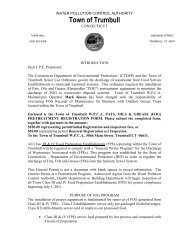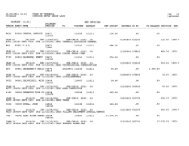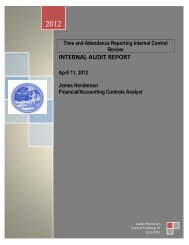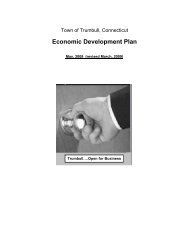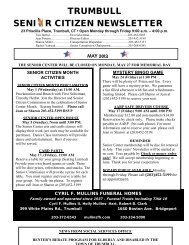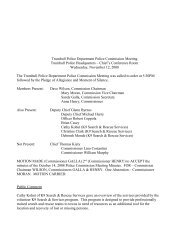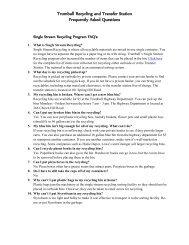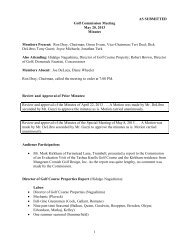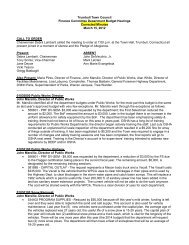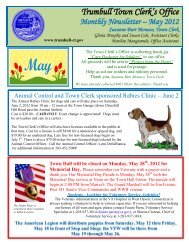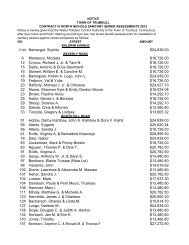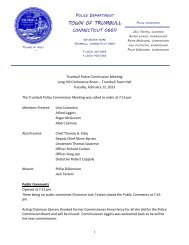ARTICLE IV. CODE OF ETHICS* - Trumbull
ARTICLE IV. CODE OF ETHICS* - Trumbull
ARTICLE IV. CODE OF ETHICS* - Trumbull
You also want an ePaper? Increase the reach of your titles
YUMPU automatically turns print PDFs into web optimized ePapers that Google loves.
<strong>ARTICLE</strong> <strong>IV</strong>. <strong>CODE</strong> <strong>OF</strong> <strong>ETHICS*</strong><br />
http://library2.municode.com/default-test/DocView/12164/1/16/20?hilite...<br />
1 of 8 1/29/2011 9:59 AM<br />
<strong>ARTICLE</strong> <strong>IV</strong>. <strong>CODE</strong> <strong>OF</strong> <strong>ETHICS*</strong><br />
__________<br />
*Charter references: Official conduct, Ch. VII, § 28.<br />
State law references: Municipal authority to adopt a code of ethical conduct, G.S. § 7-148(c)(10)(B).<br />
__________<br />
D<strong>IV</strong>ISION 1. GENERALLY<br />
Sec. 2-521. Definitions.<br />
The following words, terms and phrases, when used in this article, shall have the meanings ascribed<br />
to them in this section, except where the context clearly indicates a different meaning:<br />
Commission shall mean the Ethics Commission referred to in chapter VII, section 22, Town<br />
Charter and sections 7-148(c)(10)(B) and 7-148(h) of the General Statutes.<br />
Officers and/or employees means the persons enumerated in section 2-523 and shall include<br />
officers.<br />
Town shall mean the Town of <strong>Trumbull</strong>.<br />
In all references herein to any parties, persons, entities or corporations the use of any particular<br />
gender or the plural or singular number is intended to include the appropriate gender or number as the test<br />
of the within instrument may require.<br />
(Code 1962, § 2-54.1(II)(B); Ord. No. TC12-4, 11-9-88)<br />
Cross references: Definitions and rules of construction generally, § 1-2.<br />
Sec. 2-522. Purpose.<br />
(a) This article is adopted for the town pursuant to chapter VII, section 22 of the Charter and<br />
sections 7-148(c)(10)(B) and 7-148(h) of the General Statutes. It is established with the purpose of<br />
setting forth ethical standards of conduct, prohibited activities and sanctions that may be imposed<br />
for violation of this Code, and/or the Charter, all of which shall be consistent with the best interests<br />
of the Town.<br />
(b) The proper operation of representative government requires that public officials, employees<br />
and other persons involved in the governmental process and in the services rendered by<br />
government be independent, impartial and responsible to the people; that government decisions be<br />
made in the proper channels of governmental structure; that public office not be used for personal<br />
gain. Public interest must be the foremost concern of those included within the scope of this article.<br />
(Code 1962, § 2-54.1(I); Ord. No. TC12-4, 11-9-88)<br />
Sec. 2-523. Applicability.
<strong>ARTICLE</strong> <strong>IV</strong>. <strong>CODE</strong> <strong>OF</strong> <strong>ETHICS*</strong><br />
http://library2.municode.com/default-test/DocView/12164/1/16/20?hilite...<br />
2 of 8 1/29/2011 9:59 AM<br />
Persons, hereinafter referred to as officials and/or employees, bound by this article are:<br />
(Code 1962, § 2-54.1(II)(A))<br />
(1) Elected or appointed Town officials, either paid or unpaid, including the Board of<br />
Education.<br />
(2) All Town employees, which shall include paid consultants of the Town and of all boards,<br />
commissions, committees and authorities, including the Board of Education.<br />
(3) Town officials and employees for a period of one (1) year following termination of such<br />
official position or employment for actions taken while serving as an official or employee.<br />
Sec. 2-524. Standards of service.<br />
(a) This article specifies and designates ethical standards of conduct required of all elected and<br />
appointed Town officials and all Town employees. Officials and employees have a responsibility by<br />
virtue of the trust vested in them by their employment or oath of office to discharge their duties<br />
conscientiously, impartially and to the best of their ability, placing the good of the Town above any<br />
personal or partisan considerations.<br />
(b) Officials and employees have an obligation to act morally and honestly in discharging all<br />
assigned responsibilities.<br />
(c) No official or employee, shall while serving as such have any interest, personal, financial or<br />
otherwise, direct or indirect, or engage in any business, employment or professional activity, or<br />
incur any obligation which is in conflict with the proper discharge of his duties or employment or<br />
which would be in conflict with any state statutes.<br />
(d) Officials and employees will conduct themselves with propriety, discharge their duties<br />
impartially and fairly, and make continuing efforts toward attaining and maintaining the highest<br />
standards of performance.<br />
(Code 1962, § 2-54.1(III); Ord. No. TC12-4, 11-9-88)<br />
Sec. 2-525. Use of town resources.<br />
(a) Town property and resources are entrusted to officials and employees for the use and benefit<br />
of residents and taxpayers of the Town.<br />
(b) No Town officer or employee shall request or permit the use of Town-owned vehicles,<br />
equipment, facilities, materials or other property for personal convenience or profit, except when<br />
such are available to the public generally or are expressly provided for the use of such Town officer<br />
or employee in the interest of the Town.<br />
(c) No Town officer or employee shall grant any special consideration, treatment, favor or<br />
advantage to any person beyond that which is generally available to residents and taxpayers of the<br />
Town.<br />
(d) The abuse or misuse of Town property or resources is an unethical practice. Town property<br />
which is legitimately placed in the trust of an official or employee will be preserved and cared for to<br />
the best of his ability.<br />
(e) Requests for Town reimbursement for travel, lodgings or any other expenses incurred in<br />
connection with nonofficial business, or for family members of officials or employees or others who<br />
are not on official business, represents a breach of ethical behavior.<br />
(Code 1962, § 2-54.1(<strong>IV</strong>); Ord. No. TC12-4, 11-9-88)
<strong>ARTICLE</strong> <strong>IV</strong>. <strong>CODE</strong> <strong>OF</strong> <strong>ETHICS*</strong><br />
http://library2.municode.com/default-test/DocView/12164/1/16/20?hilite...<br />
3 of 8 1/29/2011 9:59 AM<br />
Sec. 2-526. Treatment of public.<br />
(a) Officials and employees represent the Town and reflect the relationship between Town<br />
government and the public. When relating to the community, officials and employees must bear in<br />
mind their roles as public servants. Every person is entitled to courteous, impartial, fair and equal<br />
service. Each person is entitled to all of the benefits and services available to each and every other<br />
individual in like circumstances.<br />
(b) Officials and employees shall make every reasonable effort to inform the public of its rights to<br />
town services.<br />
(c) Officials and employees will treat the public with tact and courtesy and give proper and<br />
expeditious consideration to the public's needs.<br />
(d) Should an official or employee be requested to perform an unethical or illegal act, it must be<br />
declined and also should be reported to his superior officer, First Selectman, Chief of Police or the<br />
Ethics Commission whichever is appropriate.<br />
(e) Officials and employees shall not grant preferential treatment to any person.<br />
(Code 1962, § 2-54.1(V); Ord. No. TC12-4, 11-9-88)<br />
Sec. 2-527. Conflicts of interest.<br />
(a) Town officials and employees shall be acutely sensitive to possible conflicts of interest and<br />
shall carefully avoid such conflicts. Attention is called to chapter VII, section 28(A) of the Charter,<br />
which states that disclosure is required.<br />
(b) A conflict of interest is declared to exist when the vote or other official act of any official or<br />
employee may result in the personal advantage or financial gain, or otherwise affect the financial<br />
interest of:<br />
(1) That official or employee;<br />
(2) The following relatives of that official or employee, or of the relatives of the spouse of<br />
that official or employee; spouse, child, grandchild, parent, grandparent, sibling, aunt, uncle,<br />
niece, nephew, cousin;<br />
(3) A member of the immediate household, residing with that official or employee;<br />
(4) An individual, partnership, association or corporation with whom that official or<br />
employee has, or within one (1) year of the taking of the vote or official action in question<br />
had, financial or business dealings; provided, that financial or business dealings shall not<br />
include routine, insubstantial or commonplace business transactions of ade minimus nature<br />
or those shared or engaged in by the public at large;<br />
(5) A corporation of which a person described in subsections (b)(1), (2) or (3) above is an<br />
officer, director, employee or the owner or controller of more than five (5) percent of any of<br />
the capital stock;<br />
(6) A partnership of which a person described in subsections (b)(1), (2) or (3) above is a<br />
partner.<br />
(c) There is specifically excluded from the definition set forth in subsection (b) a financial gain or<br />
advantage incident to a program or project in the nature of a public work or improvement, which<br />
financial gain or advantage is common to or shared by a class of residents of the Town, which<br />
class is restricted only by geographical proximity to the location of such public work or<br />
improvement; nor shall an official be prevented from voting upon the annual Town budget. An<br />
official shall not be prevented from voting upon any matter involving any class of residents of the
<strong>ARTICLE</strong> <strong>IV</strong>. <strong>CODE</strong> <strong>OF</strong> <strong>ETHICS*</strong><br />
http://library2.municode.com/default-test/DocView/12164/1/16/20?hilite...<br />
4 of 8 1/29/2011 9:59 AM<br />
Town or group of municipal employees only if the vote of that official may result in the financial gain<br />
or personal advantage or otherwise effect the financial interest of that official's spouse, parent,<br />
grandparent, child, grandchild, sibling, aunt, uncle, niece, nephew, cousin or any other person who<br />
shares the same home with the official to the exclusion of other members of the class.<br />
(d) When a conflict or the possibility of a conflict exists, the interested official or employee shall,<br />
as soon as such conflict or possible conflict becomes evident or reasonably should have become<br />
evident to him, make full disclosure of such conflict to the appropriate governmental body including<br />
but not limited to the board or commission on which the particular person sits.<br />
(e) Such interested official or employee shall not thereafter vote or participate in any deliberations<br />
or proceedings on such matter.<br />
(f) An official or employee shall not use his public position to obtain or attempt to obtain a special<br />
advantage in official matters for himself, a client or for any of the individuals set forth in subsection<br />
(b); nor shall he use his public position to influence, or attempt to influence the Town Council or any<br />
board, commission, committee, authority or paid consultant of the Town, to act in favor of himself,<br />
a client or for any of the individuals set forth in subsection (b).<br />
(Code 1962, § 2-54.1(VI); Ord. No. TC12-4, 11-9-88)<br />
Sec. 2-528. Disclosure of confidential information.<br />
(a) Confidential information is any information not then in the public record or which is exempt<br />
from the public record or disclosure by law including section 1-19(b) of the General Statutes and<br />
which is obtained only by reason of an official's or employee's position.<br />
(b) No official or employee shall willfully and knowingly disclose to any other person confidential<br />
information acquired by him in the course of and by reason of his official duties or employment or<br />
use any such information for the purpose of anyone's personal or pecuniary gain.<br />
(c) No official or employee shall accept other employment which will require him, or induce him, to<br />
disclose confidential information acquired by him in the course of and by reason of his official<br />
duties.<br />
(Code 1962, § 2-54.1(VII); Ord. No. TC12-4, 11-9-88)<br />
Sec. 2-529. Gifts, gratuities, favors.<br />
(a) If officials and employees, because of their positions in Town, are offered gifts, loans or<br />
privileges in the expectation of influencing their actions and/or decisions, then such offerings are<br />
bribes, and the acceptance of them is unethical. Attention is called to chapter VII, section 28(B) of<br />
the Charter.<br />
(b) Officials and employees shall not solicit or accept gifts, either in goods or services, loans or<br />
privileges offered them because of their positions in Town government except that dinners,<br />
banquets and the like given by civic, charitable, fraternal, nonprofit or political organization shall be<br />
permitted.<br />
(c) It is unethical for an official or employee to give preferential treatment in response to gifts,<br />
loans or privileges offered to an official, employee, family member or business associates.<br />
(d) Subsections (b) and (c) do not preclude the acceptance of reasonable gifts at the time of<br />
retirement or at public occasions held to honor an official or employee. The public honoring of an<br />
individual makes reasonable gifts appropriate and acceptable.<br />
(Code 1962, § 2-54.1(VIII); Ord. No. TC12-4, 11-9-88)
<strong>ARTICLE</strong> <strong>IV</strong>. <strong>CODE</strong> <strong>OF</strong> <strong>ETHICS*</strong><br />
http://library2.municode.com/default-test/DocView/12164/1/16/20?hilite...<br />
5 of 8 1/29/2011 9:59 AM<br />
Sec. 2-530. Employment incompatible with town duties.<br />
(a) Unpaid officials may have regular employment and Town employees may have employment<br />
additional to Town positions unless otherwise provided by law or collective bargaining agreement.<br />
Officials and employees have a responsibility to perform Town duties unencumbered by conflicting<br />
demands placed upon them by virtue of their commitment to other employment.<br />
(b) No official or employee shall engage in or accept private or other public employment or render<br />
services for private interests when such employment or services are incompatible with the proper<br />
discharge of official duties.<br />
(c) Officials and employees shall disqualify themselves from all discussions, attempts at<br />
influencing the view of others and decision-making with respect to any issues in which their private<br />
or other employment may conflict with their Town positions.<br />
(d) No official or employee shall accept other employment that will impair his independence of<br />
judgment as to his official duties or employment or conflict with his ability to perform such duties.<br />
(Code 1962, § 2-54.1(IX); Ord. No. TC12-4, 11-9-88)<br />
Sec. 2-531. Political activities.<br />
(a) Recognizing that political activity is an integral part of the democratic process, all officials and<br />
employees are free to engage in political activity to the widest extent consistent with the proper<br />
discharge of their official Town duties and fair and equal treatment of all townspeople.<br />
(b) Officials and employees shall not allow partisan politics and political activities to materially<br />
interfere with the proper discharge of their official duties.<br />
(c) No official or employee shall use the power or influence of his position to coerce participation<br />
in political activity or contributions to same.<br />
(Code 1962, § 2-54.1(XI); Ord. No. TC12-4, 11-9-88)<br />
Sec. 2-532. Sanctions.<br />
Sanctions imposed by the Ethics Commission shall be:<br />
(1) A public reprimand filed with the Town Clerk;<br />
(2) A recommendation to the hiring authority to take such disciplinary or removal<br />
proceedings as may be appropriate or warranted;<br />
(3) A recommendation to the Town Attorney or State's Attorney that further action be taken<br />
in accordance with the laws of the state.<br />
(Code 1962, § 2-54.1; Ord. No. TC12-4, 11-9-88)<br />
Secs. 2-533--2-545. Reserved.<br />
D<strong>IV</strong>ISION 2. ETHICS COMMISSION*<br />
__________<br />
*Charter references: Ethics Commission, Ch. VII, § 22.
<strong>ARTICLE</strong> <strong>IV</strong>. <strong>CODE</strong> <strong>OF</strong> <strong>ETHICS*</strong><br />
http://library2.municode.com/default-test/DocView/12164/1/16/20?hilite...<br />
6 of 8 1/29/2011 9:59 AM<br />
__________<br />
Sec. 2-546. Officers.<br />
(a) The officers of the commission shall be a Chairman, a Vice-Chairman and a Secretary.<br />
(b) The Chairman shall preside at all meetings.<br />
(c) The Vice-Chairman shall perform the duties of the Chairman in the event of the Chairman's<br />
absence, death, resignation or inability for any other reason to act.<br />
(d) The Secretary shall cause to have taken minutes of all meetings and issue all notices required.<br />
(e) The members of the Commission shall elect their officers at the first meeting of the<br />
Commission after appointment of members to expired terms. Such organization meeting shall be<br />
held not later than sixty (60) days after such appointments.<br />
(Code 1962, § 2-54.1(Art. I))<br />
Sec. 2-547. Meetings.<br />
The Commission may meet monthly if it has business to transact or as soon as seen as reasonably<br />
possible after receipt of a complaint or at such other time that the Chairman shall deem necessary.<br />
(Code 1962, § 2-54.1(Art. II); Ord. No. TC12-4, 11-9-88)<br />
Sec. 2-548. Quorum.<br />
The presence of three (3) members shall be required to conduct the Commission's business. A<br />
majority of the members present may act upon any matter for the Commission except for a finding of an<br />
ethics code violation and/or the imposition of sanctions which shall require a majority vote of the<br />
membership of the Commission. Any hearing on a complaint shall require the continued presence of at<br />
least three (3) members of the Commission. A member of the Commission who fails to attend the entire<br />
hearing on any complaint shall not be entitled to vote thereon.<br />
(Code 1962, § 2-54.1(Art. III); Ord. No. TC12-4, 11-9-88)<br />
Sec. 2-549. Public presence.<br />
(a) Meetings concerning operating administrative affairs shall be open to the general public.<br />
(b) Meetings involving specific complaints or investigations shall be open to the public only after<br />
the Commission has decided to accept the complaint and proceed with an investigation.<br />
(Code 1962, § 2-54.1(Art. <strong>IV</strong>); Ord. No. TC12-4, 11-9-88)<br />
Sec. 2-550. Case procedure.<br />
(a) No complaint shall be accepted by the Commission unless it is reduced to writing, dated,<br />
signed and sworn to by the complainant before a notary public or Commissioner of the Superior<br />
Court. The complaint shall contain a statement of the underlying facts and identify, to the extent<br />
possible, the names and individuals involved, the nature of the alleged violation, and the date or
<strong>ARTICLE</strong> <strong>IV</strong>. <strong>CODE</strong> <strong>OF</strong> <strong>ETHICS*</strong><br />
http://library2.municode.com/default-test/DocView/12164/1/16/20?hilite...<br />
7 of 8 1/29/2011 9:59 AM<br />
dates of such violation.<br />
(b) Such complaint shall be mailed or delivered to the Chairman of the Ethics Commission in care<br />
of the Town Clerk, Town Hall, <strong>Trumbull</strong>, Connecticut. The Town Clerk will advise the Chairman of<br />
the receipt of such mail and hold it unopened for delivery to the Chairman.<br />
(c) Each request for Commission action shall be assigned a file number by the Commission and<br />
be identified by same. A cover sheet shall record the official date of receipt, dates of all required<br />
notices, meetings on same and action taken.<br />
(d) Except where a complaint is filed by the Commission, upon receipt of a complaint, the<br />
Commission shall meet in executive session and decide whether to dismiss the complaint for lack<br />
of jurisdiction or lack of probable cause or to accept the complaint and to proceed with any<br />
necessary investigation. In the event that the Commission proceeds with the complaint, the<br />
Commission shall promptly notify the person charged with any violation in writing by sending to the<br />
person charged a copy of the complaint. Any person charged may be represented by counsel and<br />
all hearings shall be recorded by stenographic recording or tape. The Commission shall have the<br />
power to require the attendance of any witness by subpoena. Any person charged shall be notified<br />
in writing at least ten (10) business days prior to any hearing regarding the complaint. At the<br />
beginning of the hearing, the Commission may, in its discretion, ask for clarification of the issues<br />
involved after which the complaining party or his attorney, shall present his claims, proofs and<br />
witnesses who shall submit to questions or other examination by the party charged or his attorney,<br />
the Commission or its attorney, and counsel for the complaining party, if any. Thereafter, the party<br />
charged, or his attorney, shall present his defenses, proofs and witnesses who likewise shall submit<br />
to questions from the complaining party or his attorney, the Commission or its attorney or counsel<br />
for the party charged. Exhibits, when offered by either party, may be received in evidence including<br />
affidavits sworn to under oath, to afford a full and equal opportunity for the presentation of any<br />
material or relevant proofs. The Commission my in its discretion vary the foregoing procedure<br />
where in the interest of fairness it deems it appropriate. The Commission may proceed in the<br />
absence of any person charged with a complaint, the charging party or any witnesses but shall<br />
make every effort to receive sufficient competent evidence in order to render a just and final<br />
decision.<br />
(e) After hearing and within one hundred twenty (120) days of the filing of the complaint, the<br />
Commission shall notify the complainant, the person charged, and the Town Clerk of its final action<br />
in writing and the sanction, if any, imposed. Any such action shall be deemed final. The<br />
Commission shall have the right to reject any complaint or request for advisory opinion if it<br />
determines, by majority vote, that the matters presented have been previously heard by the<br />
Commission and appropriate action has been taken.<br />
(f) The Commission may be guided by the advisory opinions of the Ethics Commission of the<br />
state (See: Conn. Gen. Stat. S1-81), and the opinions of the Connecticut Bar Association with<br />
respect to the code of professional responsibility, and shall abide by the laws of the state.<br />
(Code 1962, § 2-54.1; Ord. No. TC12-4, 11-9-88)<br />
Sec. 2-551. Findings and recommendations.<br />
Any findings and recommendations of the Ethics Commission arrived at after a full hearing shall be<br />
recorded with the Town Clerk.<br />
(Code 1962, § 2-54.1(Art. VI))<br />
Sec. 2-552. Advisory opinions.<br />
The Commission may render advisory opinions of a general nature, without reference to any
<strong>ARTICLE</strong> <strong>IV</strong>. <strong>CODE</strong> <strong>OF</strong> <strong>ETHICS*</strong><br />
http://library2.municode.com/default-test/DocView/12164/1/16/20?hilite...<br />
8 of 8 1/29/2011 9:59 AM<br />
specific case, to guide officials and employees with respect to the application and interpretation of the<br />
code of ethics, but no such opinion shall be rendered unless approved by the majority of the membership<br />
of the Commission.<br />
(Code 1962, § 2-54.1(Art. VII); Ord. No. TC12-4, 11-9-88)<br />
Sec. 2-553. Amendments.<br />
The Commission may, from time to time, in its discretion, suggest amendments to the Code of<br />
Ethics for approval by the Town Council by ordinance.<br />
(Code 1962, § 2-54.1(Art. VIII); Ord. No. TC12-4, 11-9-88)<br />
Secs. 2-554--2-570. Reserved.


